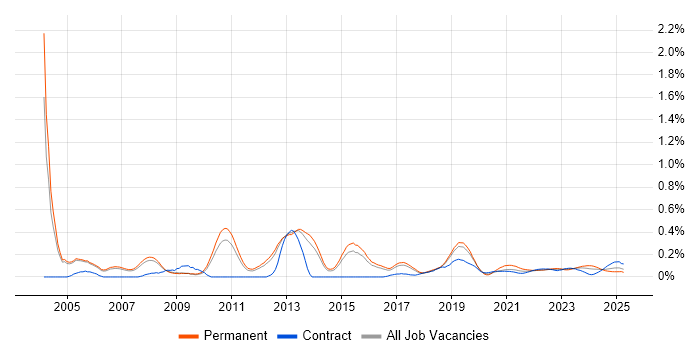Enterprise Storage
UK > Work from Home
The table below looks at the prevalence of the term Enterprise Storage in remote or hybrid work. Included is a benchmarking guide to the salaries offered in vacancies that cited Enterprise Storage over the 6 months leading up to 7 May 2025, comparing them to the same period in the previous two years.
| 6 months to 7 May 2025 |
Same period 2024 | Same period 2023 | |
|---|---|---|---|
| Rank | 426 | 546 | 632 |
| Rank change year-on-year | +120 | +86 | +184 |
| Permanent jobs citing Enterprise Storage | 6 | 37 | 30 |
| As % of all permanent jobs with a WFH option | 0.037% | 0.11% | 0.071% |
| As % of the Miscellaneous category | 0.095% | 0.31% | 0.18% |
| Number of salaries quoted | 6 | 35 | 30 |
| 10th Percentile | - | - | £48,175 |
| 25th Percentile | £31,250 | £31,250 | £57,500 |
| Median annual salary (50th Percentile) | £32,500 | £32,500 | £61,750 |
| Median % change year-on-year | - | -47.37% | -3.52% |
| 75th Percentile | £33,750 | £47,625 | £81,250 |
| 90th Percentile | £51,250 | £52,500 | £87,500 |
| UK median annual salary | £53,688 | £45,750 | £60,000 |
| % change year-on-year | +17.35% | -23.75% | - |
All Generic Skills
Work from Home
Enterprise Storage falls under the General and Transferable Skills category. For comparison with the information above, the following table provides summary statistics for all permanent job vacancies with remote or hybrid options requiring generic IT skills.
| Permanent vacancies with a requirement for generic IT skills | 6,321 | 12,035 | 16,379 |
| As % of all permanent jobs with a WFH option | 38.53% | 35.54% | 38.65% |
| Number of salaries quoted | 3,873 | 9,257 | 11,852 |
| 10th Percentile | £35,000 | £32,500 | £39,000 |
| 25th Percentile | £47,231 | £42,500 | £48,750 |
| Median annual salary (50th Percentile) | £65,000 | £59,500 | £65,000 |
| Median % change year-on-year | +9.24% | -8.46% | - |
| 75th Percentile | £85,000 | £78,750 | £86,250 |
| 90th Percentile | £122,500 | £101,250 | £107,500 |
| UK median annual salary | £60,000 | £55,000 | £65,000 |
| % change year-on-year | +9.09% | -15.38% | +4.00% |
Enterprise Storage
Trend for Jobs with a WFH Option
Job vacancies with remote working options citing Enterprise Storage as a proportion of all IT jobs advertised.

Enterprise Storage
Salary Trend for Jobs with a WFH Option
3-month moving average salary quoted in job vacancies with remote working options citing Enterprise Storage.
Enterprise Storage
Salary Histogram for Jobs with a WFH Option
Salary distribution for jobs with remote working options citing Enterprise Storage over the 6 months to 7 May 2025.
Enterprise Storage
Co-occurring Skills and Capabilities with WFH Options by Category
The follow tables expand on the table above by listing co-occurrences grouped by category. The same employment type, locality and period is covered with up to 20 co-occurrences shown in each of the following categories:
